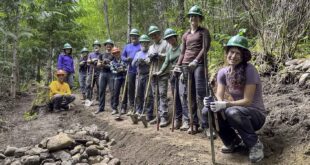Your mother used to shout, “Go outside and play.” I know. I lived next door and could hear her through four walls and a carefully manicured hedge. Like dogs that join in when they hear another K-9 in the distance, every other mom in the neighborhood followed suit, forming a twilight bark of sorts that was more about moms needing a break than any genuine regard for the health benefits of their progeny.
It seems self-evident: you will be better equipped to think outside the box by getting outside the box.
Sometimes, we do the right thing for the wrong reason. Turns out we were better off for having been forced outside and into a game of stickball. We grew up healthier, eschewing cigarettes and beehive hairdos. We took our bikes into the mountains and invented mountain biking (a marked improvement over lake biking). We combined ping pong paddles and a whiffle ball to create pickleball. A lucky few became professional athletes. It was a lot of wacky fun, but we rarely paused to consider the ancillary benefits that came with it. So, for the sake of those who are outdoors-active and those who are merely outdoors-curious, I offer the following case of what’s in it for you, aside from pleasing your mom.
Feel Great
Studies show that time spent outside improves sleep quality by reinforcing the circadian rhythm, enhances our mood by releasing serotonin and endorphins, and reduces stress by decreasing cortisol levels. Not good enough, you say? They also show that time spent outdoors improves a person’s mental health. That’s not to say your Uncle Rick will stop believing a troll lives in the attic, but he will care a lot less.

Look Good
Sunlight has anti-inflammatory properties that can help improve certain skin conditions like acne, psoriasis, and eczema. That’s a fine start to looking good. How about some weight loss? Numerous studies have shown that we tend to burn more calories when engaged in outdoor activities. Alfresco enterprises even improve our posture by strengthening the muscles around the spine. Look at you!
Solve the World’s Problems
You’re already off to a great start toward solving the world’s problems by feeling great and looking good. After all, you will need to do a lot of persuading to move the levers of government and nature, and who is going to take you seriously if you’re depressed and dressed for rehab?
It’s not a heavy lift to suggest you might need a boost to your creativity to tackle the world’s problems. These problems are largely the result of humans all thinking the same way at the same time. You may have guessed this already, but the answer is more time outside. Being outdoors brings a person to a state of relaxation, and we tend to be most creative when relaxed. It seems self-evident: you will be better equipped to think outside the box by getting outside the box.
The world’s problems are complex. You can’t explain climate change by bringing a snowball to the floor of the Senate. So, you will benefit from increased brain function. Again, with the outdoors. Improved mental focus and the ability to concentrate for extended periods have long been associated with time spent in nature. You don’t have to take my word for it. Just ask John Muir, Leonardo da Vinci, Warren Buffett, or Henry David Thoreau. All have advocated for time spent outdoors to open the higher mind.
The Best Reason
In the words of Alan Titchmarsh, “Nature is a masterpiece of beauty, a never-ending source of wonder and inspiration.” As someone who has been to every continent and most corners of each, I can say we live in the most beautiful place on earth. The Pacific Northwest is a magical and unspoiled place. The Puget Sound, mountains, rivers, forests, and farmlands are all easily within reach.
So, listen to your mother. Go outside and play.
 Dave Mauro is a forty-year Bellingham resident and author of The Altitude Journals. He has climbed the highest peak on each of the seven continents, yet shamelessly holds out for a closer parking space at Costco. His inspirations include outdoor spaces, the writing of Richard Brautigan, and caffeine.
Dave Mauro is a forty-year Bellingham resident and author of The Altitude Journals. He has climbed the highest peak on each of the seven continents, yet shamelessly holds out for a closer parking space at Costco. His inspirations include outdoor spaces, the writing of Richard Brautigan, and caffeine.
 AdventuresNW
AdventuresNW





